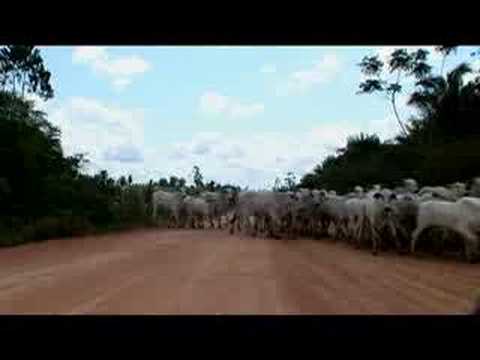While the film talks about the destruction of the rainforest – 20 square miles a day being lost to logging and ranching – the real power of the film lays in the unfettered access that Junge and his camera crew had to the court room and the lawyers for the defendants. From the arrogant defense lawyers to the earnest government agents, the documentary captures the colorful characters and tragic lack of justice in a world where rich and poor live and die with the rainforest. Sister Dorothy was murdered for a $50 payment and over a 10 square mile tract of land known as Lot 55. But as the very flippant defense lawyer, Americo Leal, says “it’s very hard to survive when you irritate people in that region.”
What the film doesn’t talk about is the connection between these loggers, ranchers and farmers and the west’s appetite for virgin paper products and cheap meat in the form of fast food, as Gavin Hudson wrote about at EcoWorldly last year. If we continue to consume products without fully understanding their genesis, then we are complicit in the problem. If you consume soy products, find out where the beans are sourced. If you consume fast food, find out where the cattle are raised and where their feed is grown. Stop buying virgin paper products.
Up until Dorothy’s murder, in Para, there had been more than 800 murders over land disputes in 30 years. Of those, only one person had ever gone to prison. So as the film follows the three ring circus that is the Brazilian legal system and as the state prosecutors try to go after the rancher that paid for the murder, we see first hand the complicity between the systemic failures on every level and the destruction of the Amazon for commercial purposes.
While the environment, namely the protection of the Amazon, is at the center of They Killed Sister Dorothy, it is really a film about social justice and a horribly broken legal system. It underscores the incredible obstacles to protecting the Amazon and addressing poverty in Brazil, but it also highlights the number of people that want to do the right things. “Dorothy lived her faith,” says Daniel Junge, “she was faith in action.” Dorothy’s legacy lives on in Esperanza and the Sisters of Notre Dame who took over her work after she was killed.
The film is illuminating in ways that have the power to create change. It was shown to the Brazilian Congress, at the Economic Social Forum and won an award in Brasilia. Dorothy’s brother Tom Stang said he hoped the film would “bear good fruit.” The fruit it bears will be up to those that watch it and feel inspired to take action because of it.


Bobby B.
The murder of any individual is a tragic event regardless of how we feel about their environmental/political agenda. There is little doubt that Sister Dorothy touched the lives of many. Hopefully, her desire to “save planet earth” never eclipsed her desire to share the Gospel of Grace with “the people she loved” for the santification of their souls.
I found the following phrase in this piece the most interesting:
“She was called a devil and an agent of North America by those who hated her…”
For the vast majority of environmentalists, North America and the other industrialized nations of the West generally represent the side of evil in the green battle over the planet. How ironic that some of the locals referred to an environmentalist as an evil agent of North America. Even though the West is not perfect, there is no denying that we have made positive strides in the areas of preservation and conservation to balance our consumerist ways. Maybe the greens’ desires to turn the west into the third world and to stop all progress in the third world are a bit misdirected.